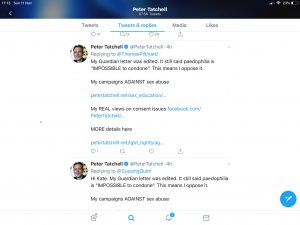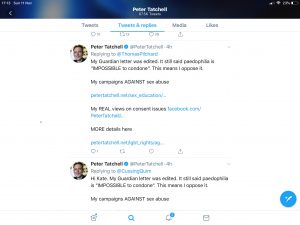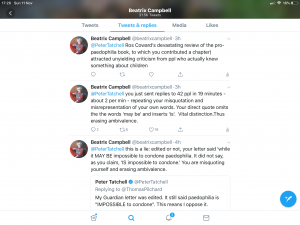Here is a letter I’ve sent to Peter Tatchell following his bitter tirade against feminists.
I should explain: We had been in email conversation for a while, after I’d asked him, as a human rights activist, to sign (with about 200 of us) a letter to The Observer protesting against the harassment and censorship of women participating in the government’s consultation on the Gender Recognition Act. No, he didn’t want to sign it unless it specified trans rights. It was not about trans rights, It was about women’s rights to speak and organise. No, he didn’t want to sign it.
I admit, many friends and colleagues wondered, why bother? This is why: he is an emblematic figure in gay and human rights politics. That made it worth it.
He ended that dialogue when I challenged him about support for feminist campaigner Julie Bindel after the Truth to Power Cafe at the Roundhouse in October – an event to which he had been invited to participate – disinvited her. He discontinued our conversation. But he continued his public convos on Twitter, and the more he says the worse it gets.
I sent him this letter following his embarrasingly poor responses to challenges to his 1997 interview with a 14-year-old boy, ‘Lee’, and what he calls the child’s ‘affair’ and involvement in ‘the rent scene’ – what most of us would call abuse – and to his argument about consent and what he calls “sex education.”
Just let’s think abut another conversation Tatchell could have had with ‘Lee’: a boy exploited through prostitution; he could have said, ‘I’m sorry I encouraged you inappropriately, to talk about sex; I’m not qualified to do this, and I did it to service my own agenda; I should have put you in contact with someone who could have protected you; I’m sorry I didn’t. I won’t talk to a young person like this, ever again.’
He could have said, ‘i understand your difficulties, but this does not decribe being gay, it tells me that no one has taken care of you, you need a rest. Trust me, you need to be protected. Then, who knows… you might decide you are gay, wonderful; you might descide you are straight, and that’s wonderul, too. But you did not learn about being gay, or not being gay, by being abused.’
Peter did not do that, as far as we know, and that is very worrying.
Of course, Twitter doesn’t hack it, so here is an edited version of my letter – introducing the tweets and links – to Peter Tatchell.
Peter replied on 12 November – it is published below.
Of course, the hardest word is sorry, but it would be a relief – for him and the rest of us – if he could say it, and then be quiet for a while:
11 November 2018
Oh Peter, what have you done!
I’m afraid you will rue the day when you re-wrote, misquoted and misrepresented your own words after you were confronted with your opinions on adult-child sex and your tirade against feminists.
You will of course deny sexism and support for paedophilia. But feminists of many hues, ethnicities, ages and orientations will have read your tweets with horror and sorrow.
Here is your tweet against ‘white feminists’
It is you who are so wrong.
Among my most vivid political memories is a massive public meeting in Croydon in defence of Kiranjit Ahluwalia, whose case had been taken up in 1989 by Southall Black Sisters, who were supported by Justice for Women. She had been brutalised by her husband and then imprisoned for killing him. We heard her taped voice from prison. It was searing. The meeting was attended by black and white feminists. I know because I was one of the speakers.
Justice for Women, founded by Harriet Wistrich (Liberty lawyer of the year) and Julie Bindel – both white lesbians – has always campaigned with and for black women. Clearly, you appear to be unaware that Southall Black Sisters and Justice for Women – among the most robust and innovative organisations to emerge from the Women’s Liberation Movement – have worked together for decades.
Or more recently, perhaps, do you know that black and white women have worked together to drag the criminal justice, and social services systems to support girls enduring abuse and exploitation by both black and white men. Rhetorical question – I don’t think you do.
You complain that white feminists weren’t on your demos or at your meetings – that’s hardly surprising and it is of no significance. The point is you weren’t with them.
I don’t want to enter a defence of ‘white women’ in response to your slurs. Racism – like sexism – is ubiquitous. But I suggest that you need to check your history and your motives.
Your misanthropy is compounded by vanity, the litany of complaint, sometimes aired minute by minute in your tweets, that your words get edited and therefore do not express what you wanted to say.
But then you edited yourself. Your trail of tweets accusing feminists of ‘too busy demonising trans people as a threat to women. So wrong!’ had gone too far. So, you cut out the nasty smear in subsequent tweets on the same theme using the same photograph.
However, be assured – we saw it, we read it and we remember it. That sentiment was in your head. I believe that it expresses what you feel and think. Show us if we are wrong, but it appears that condemning feminism in your defence of trans rights has become de rigeur.
By the way, the feminists who are your targets have not and do not oppose trans rights. We are not anti-trans. We are feminists trying to clarify the muddle and rubbish about sex/gender, and we are merely trying to defend the Equality Act’s provisions/protections and sex-segregated spaces/resources, e.g. women’s prisons, women’s refuges and abuse services, women’s short-lists, women’s representation.
I asked you if you would stand up for Julie Bindel after she was ‘dis-invited’ by the organiser of the Truth to Power Café at the Roundhouse. You didn’t defend her and you didn’t reply to me: I fact you accused me of making false allegations and then decided to end the conversation.
Abuse and exploitation
Women and men will read with similar horror and sorrow your rather deceptive re-writing of your own words on paedophilia (not a term I use – it softens the intentions and impact of abusers).
You are now caught in an inescapable convergence, your reputation is in grave danger. It may already have been lost.
In the renewed flurry of concern about your defence of child-adult sex over many years, you have edited what you wrote in the 1990s. There is something unseemly in your brittle rebuke to feminists reminding you – in the hope that you might show that you have learned something – of your tolerance of adults’ sexual relationships with children.
You invoke in your defence, your letter to The Guardian in the 1990s rebuking Ros Coward for her critique of the pro-paedophile book Dares to Speak. What you now claim is that what you then wrote was: ‘it is “impossible to condone paedophilia”.’
But that is a con.
What you actually wrote on 26 June 1997 was, ‘it may be impossible to condone paedophilia’.
On 1 July 1997 what you claimed you had written was that ‘paedophilia “is impossible to condone”.’
Why change it ‘may be’ to it ‘is’?
This is sneaky semantics: you change the words and relocate the direct quotation marks, and what this achieves is to declare certainty where you had expressed ambivalence.
For a forensic chronicle of the episode check out yourself – and your critics – in the indispensable Spotlight on Abuse: https://spotlightonabuse.wordpress.com/2014/03/25/peter-tatchell-and-dares-to-speak/
It is chastening read.
Then, in the letter to The Guardian, you go on to defend sexual relationships between children and adults by arguing that the children liked it, found joy, and said they weren’t harmed. So, which is it – possible, or impossible to condone sex between adults and children?
The interview with ‘Lee”
Now, to your purported ‘interview in 1997 with the boy called ‘Lee’, which is still up on your website. You have not reflected upon it or repudiated it. It is a culpable accommodation of abuse. Here is a child, involved in sex at eight years old, in care and, by his own account, involved in prolific sexual activity, including anal penetration, and being exploited by adult men through prostitution – you call it the ‘rent scene’.
There is no word in that interview that conveys the shudder many of us have felt reading it. Nothing to indicate that you were worried that this boy was in danger, or that you sought to get him professional assistance and protection. We are left with the inevitable inference that you regarded his way of life as a ‘life-style choice’ – the term used by the authorities in Rotherham and other cities in the last decade to judge girls who were being snared, abused and exploited by gangs of men.
What is the difference between those girls and ‘Lee’? What is the difference between your thinking then and now? There has been a mighty body of research and literature since the 1970s exposing how children’s perceptions of adults’ sexual interest in them is framed by adults’ agenda. You don’t acknowledge it.
Part of our shared history (gay men and gay women, aka lesbians, women and men generally of a certain age) is the moment when child abuse and exploitation was put back on the political agenda in the 1980s.
Why is this important now? Because gays have always been vilified and traduced as paedophiles.
Some men in churches and children’s homes mobilised a gay alibi to cover child sexual abuse. Historically, that alibi completely compromised male homosexuality, and even now it is a smear to which some gay men’s ideologies lend currency. That’s why many of us are so worried by what you have written.
I’m not suggesting, in any way at all, that you have a sexual interest in children. But there is a but: You do not seem to appreciate why you are discredited by this advocacy. The alibi has been explicitly condemned by independent experts and by the Independent Inquiry into Child Sexual Abuse – go along to IICSA some time, Peter, listen and learn from the narratives of horrible childhoods in the 1980s and 1990s.
Following your letter to the Guardian in the 1990s, there was a raft of responses that anyone else might have taken very seriously: the child abuse lawyer Richard Scorer, a key figure in the current Independent Inquiry, Valerie Howarth, director of Childline; Marjorie Orr, whose monitoring of the terrain, Accuracy About Abuse, was a key resource throughout the 1990s.
You seem to have ignored them. That’s why people who prioritise children’s safety and wellbeing are not reassured by your blether about ‘I campaign against child abuse’. Give us the evidence.
When you have been reproached by feminists – and Julie Bindel has been challenging you for years – you re-iterate a narcissistic bleat that your letters/comments/positions have been edited and that you have been misrepresented.
The vital thing in all of this is power: that’s the word that is missing from your children-and-sex commentaries.
And if you want to know why feminists (and indeed many men) keep reminding you of your position it is because they know something about child sexual abuse – as an abuse of power – and you seem not to. You proclaim your own sex education work (about which many of us have some concerns) whilst you ignore the campaign to reform sex and relationship education by a consortium of more than 50 women’s organisations, co-ordinated by End Violence Against Women.
Just so that you know, this is not to accuse you of paedophilia, it is, however, to say that won’t let go of a discredited libertarian tolerance that places you in proximity to advocates of paedophilia.
Of course, the hardest word is sorry, but it would be a relief – for you and the rest of us – if you could say it, and then be quiet for a while.
——————————————————————————————————————————
12 November 2018
Peter Tatchell sent this response:
Thank you. And yes, of course, would welcome any discussion or debate.
Beatrix



Having been a sexually exploited child and teen, I recognize and shudder at the vicarious longing in Tatchell’s voice at being eight years old and plowed by kindly older men.
Thank you Ms. Campbell and Ms. Bindel, for your clear-headed resolve.
Peter Tatchell lies and it is important to use peadophilia, because they do not see peadophilia as the same thing as abuse. I am pretty certain I have read output from him in the early 2000s as well on lowering age of consent …he has been pretty consistent on this. He refers not only to 14, but 9 as above, and Stonewall literature mentions 6. The responses to the Scottish GRA consultation had significant percentages supporting no minimum age. Libdem and other policies support the idea of “informed consent” from children re. Puberty blockers etc.. If a child can give consent, informed consent at any age … for such processes then it will be argued they can give ‘informed consent’ on other things. One must ask why would a man spend a lifetime arguing that sexual relationships between the very young and the old causes no harm, and can be pleasurable, and for lowering age of consent? This is the argument of peadophiles.
Pingback: “Pioneering” is one word for it - Butterflies and Wheels
Tatchell is unrepentant